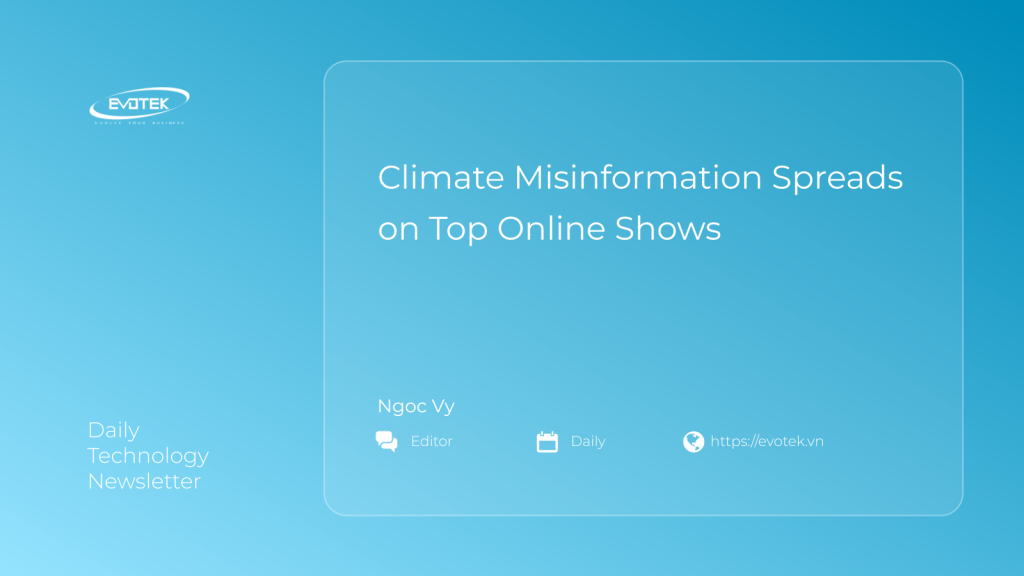The fight against climate change faces a new challenge: the proliferation of misinformation through popular online shows. While outright denial of global warming is waning, a new, subtler form of climate denial is gaining traction, often fueled by significant advertising budgets.
Instead of claiming climate change isn’t real, these shows focus on false or misleading messages, such as:
- “Climate solutions don’t work.”
- “Climate change has some benefits.”
- “Pollution reduction policies are tools for governments to control people.”
According to the Center for Countering Digital Hate, this “new denial” made up 70% of all climate denial claims on YouTube in 2023, a significant jump from 35% in 2018.
Social Media Influencers: A Key Source of News
A growing number of Americans, particularly young adults, rely on social media influencers for news. Pew Research Center indicates that about one in five U.S. adults and 37% of adults under 30 regularly get their news from these sources.
A Yale Climate Connections analysis reveals that eight of the ten most popular online shows have spread false or misleading information about climate change. This analysis builds upon work by Media Matters for America, which has documented the dominance of right-leaning influencers in digital media spaces like podcasts and streams.
These influencers often portray those concerned about climate change as followers of a “pseudo-religion,” and deny the effectiveness of climate solutions.
Key Players and Their Messages
Several online personalities, including Joe Rogan, Ben Shapiro, and Russell Brand, have platformed Bjørn Lomborg, a Danish political scientist and author known for his climate denial views. Despite pleas from climate scientists to stop misrepresenting their science, Lomborg continues to spread misinformation.
Some show hosts promote the idea that climate change is a hoax designed for government control. Charlie Kirk, for example, has likened climate change activism to a “Trojan horse” for Marxism.
The Rise of Conspiracy Theories
Similar to COVID-19 conspiracy theories, some influencers claim climate change is a government conspiracy. Tortoise Media, a British news website, noted the merging of climate-skeptic and COVID-skeptic narratives, with some of the same personalities involved.
Tortoise Media’s analysis found significant growth in climate denial across platforms:
- Climate skeptic posts grew by 43% on YouTube from 2021 to 2024.
- Climate skeptic posts grew by 82% on X (Twitter) from 2021 to 2024.
- Claims that climate change is an instrument of control now represent about 36% of climate-skeptic content on YouTube and 40% of climate-skeptic posts on X (Twitter).
Political Echoes
This “new denial” has also found its way into political discourse. High-ranking officials have made statements downplaying the severity of climate change and dismissing climate action as a “religion.”
The Role of Big Money
The Media Matters analysis indicates that about 60% of the most popular online shows are right-leaning and wield considerable influence, boasting about five times the number of followers as left-leaning shows. This influence is often bolstered by substantial advertising budgets.
Conservative organizations like PragerU invest heavily in marketing their messages online, championing new forms of climate denial. Ben Shapiro’s The Daily Wire, for example, received significant early funding from fracking billionaires.
While proponents of climate action haven’t matched these investments, it’s important to remember that the majority of Americans understand the reality of climate change and support action. With equal financial backing, the truth could have an even more powerful impact.
This story is part of The 89 Percent Project, an initiative of the global journalism collaboration Covering Climate Now.
Related Articles
- The drafters of the Clean Air Act saw CO2 as a pollutant
- Four ways your community can save lives during this summer’s heat waves
- For climate and livelihoods, Africa bets big on solar mini-grids

 日本語
日本語 한국어
한국어 Tiếng Việt
Tiếng Việt 简体中文
简体中文